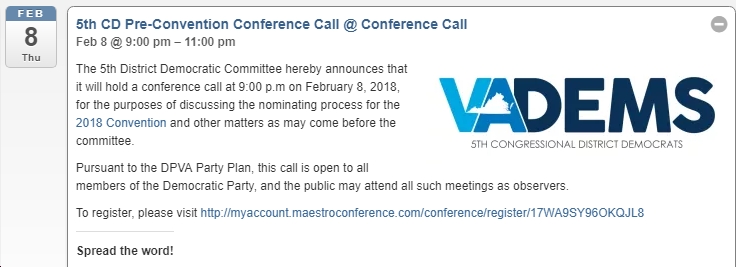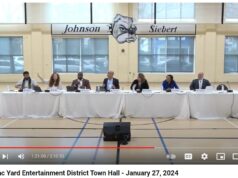 Tomorrow night at 9 pm, the 5th CD Democratic Committee is going to be holding a conference call to determine whether or not it will change its method of nomination from a Party-Run Caucus/Convention to a state-run primary. The Caucus/Convention method was chosen last October, with the convention slated for May 5 at the Firemen’s Sports Arena in Farmville. Leading up to that convention would be a series of caucuses to select 160 delegates to the convention.
Tomorrow night at 9 pm, the 5th CD Democratic Committee is going to be holding a conference call to determine whether or not it will change its method of nomination from a Party-Run Caucus/Convention to a state-run primary. The Caucus/Convention method was chosen last October, with the convention slated for May 5 at the Firemen’s Sports Arena in Farmville. Leading up to that convention would be a series of caucuses to select 160 delegates to the convention.
Last fall, when the Party-Run Caucus/Convention method of nomination was selected, the 5th CD Democratic Committee Chair, Suzanne Long, argued that “it is intended to focus on some of the more rural parts of the district, forcing candidates to spend time in all parts of the 5th to win over delegates.” Which, to my mind, are perfectly legitimate arguments by the way. So should the 5th CD Democrats switch to a primary or not? It’s their choice of course, but a few things to consider include…
First of all, I would have gone with a primary in the first place. I mean, I get the reasons for choosing a Party-Run Caucus/Convention method, but all in all I think that primaries are superior in a number of ways – greater participation of voters, more of an imperative for candidates to build the types of campaigns that can compete in the general election, less susceptible to various sorts of problems – costs, potential for mistakes, perceived biases of various sorts – when the party runs the show. As I’ve said many times before, my ideal would be a primary with ranked/range voting, so that the winner would have to get a majority. But thanks to Judge Dillon and his famous “rule, localities in Virginia aren’t – for whatever assinine reason – allowed to use ranked/range voting. Also, it would probably be better to have party registration, but that’s a whole other discussion…
Second, however, I feel like once a method of nomination is selected — even if it’s not the optimal method — changing in the middle of the process (in this case, with caucuses set to start in mid April) doesn’t seem ideal to me. One problem is that the candidates/campaigns have all been operating since late October under the Caucus/Convention assumption, have hired accordingly, organized their campaigns/strategies/etc. accordingly, you name it. To change now, over three months after the Caucus/Convention method was selected, and only two months until caucuses are slated to kick off, means that campaigns will have to shift gears in a major way. Again, that doesn’t seem like a great way to do business. But having said that, I don’t believe it’s a show stopper to changing the nomination method at this point. Not great, but not a disaster or anything either…
Finally, it does seem to me that different methods of nomination play to different candidates’ strengths, thus favoring – or disfavoring – certain candidates. For instance, generally speaking, primaries almost certainly require more money, possibly a LOT more money, than caucus/conventions, as campaigns have to reach a LOT more voters. Check out the fundraising numbers for 5th CD candidates:
VA-05
RD Huffstetler (D): Net contributions of $186,852; Cash on Hand of $474,052.
Leslie Cockburn (D): Net contributions of $195,709; Cash on Hand of $382,697
Ben Cullop (D): Net contributions of $45,863; Cash on Hand of $125,835.
Andrew Sneathern (D): Net contributions of $36,704; Cash on Hand of $121,577.
Lawrence Gaughan (D): N.A.
Rep. Tom Garrett (R): Net contributions of $90,325; Cash on Hand of $107,732.
Clearly, the two Democrats with the most cash on hand are RD Huffstetler and Leslie Cockburn, with Ben Cullop and Andrew Sneathern significantly trailing. On the surface at least, this would seem to mean that Huffstetler and Cockburn would gain an advantage in a primary compared to a caucus/convention. On the other hand, it’s not ranked/range voting, so it’s possible that either Cullop or Sneathern could win with a plurality in a primary, particularly if Huffstetler and Cockburn go after each aggressively. There are other scenarios one could game out here, and in the end, I don’t think the method of nomination should be picked based on which candidate(s) it favors. I’m also not completely convinced that either method DOES favor a particular candidate or candidates, as there are many dynamics/factors at play here, not just who has more money to go on TV or whatever.
Bottom line: The 5th CD Democrats have a big choice to make tomorrow night, and I don’t think there’s one absolutely right or absolutely wrong way to go. For me, I wish they had gone with a primary in the first place, back in October, but I still think there’s enough time for candidates to regroup an run in a primary to be held in June. And in the end, I prefer primaries, certainly for non-local (e.g., School Board, County Board) offices, unless there are overriding reasons not to go with that method of nomination. In this case, I’m not seeing those overriding reasons.
P.S. It’s worth a reminder that every other Democratic congressional committee in Virginia with multiple candidates vying for the party’s nomination (VA-01, VA-02, VA-06, VA-07, VA-09, VA-10) has selected a primary. It’s also worth noting that all of those districts have significant rural portions as well as more urban portions, kinda like the 5th CD.
P.P.S. Over at VICE, they argue about VA-05 that “Democrats will choose their nominee at a party insider–dominated convention instead of a normal primary, a terrible and anti-democratic idea that can still be reversed.”


 Sign up for the Blue Virginia weekly newsletter
Sign up for the Blue Virginia weekly newsletter









